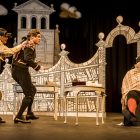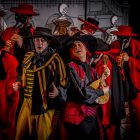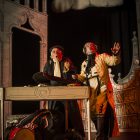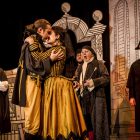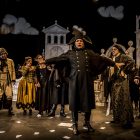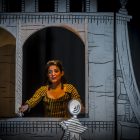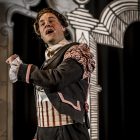The Barber of Seville
Rossini
Swansea City Opera and Orchestra
Director: Brendan Wheatley
Musical Director: John Beswick
Set Designer: Gary McCann
Costume Designer: Gabriella Ingram
Orchestral arrangement/Conductor: John Beswick
Borough Theatre, Abergavenny
17th March 2018
It was a bitterly cold night and there were flakes of snow in the air, enough to keep anyone at home in the warm and in front of the TV. But the crowds turned out to the Borough Theatre in Abergavenny to see Swansea City Opera, which must have been a relief to the theatre management, currently struggling to get enough income from ticket sales to survive beyond the next six months.
Swansea City Opera must also have been relieved to get a good audience. Like all in the arts these days, it faces its own financial restraints, one reason it has chosen for its 2018 tour to revive a production of Rossini’s The Barber of Seville from 2011. In the original production, SCO Artistic Director Brendan Wheatley played the role of curmudgeonly Don Bartolo, guardian and would-be husband of Rosina. Wheatley declares in the programme notes that this is one of his favourite roles; for this season he has combined it with taking on the job of stage direction, the director of the original having since died. Set and costumes are revived from 2011.
The Barber of Seville is related to Mozart’s The Marriage of Figaro insofar as they are both based on comedies by the French playwright Beaumarchais and the main characters are the same, but playing out different scenarios at different stages in their lives. In both operas Figaro plays a prominent part as a fixer, controlling the destinies of the other characters by his manipulations. Cast as Figaro the eponymous barber here was Swedish baritone Håkan Vramsmo, who has taken roles in several past SCO productions. He was vocally sound but seemed to me a little uncomfortable in the role, not fully commanding the action as his character demanded, and indeed as his physical height should have enabled. Having said that, his classical guitar playing was a nice touch and I very much enjoyed him singing as a trio with the would-be lovers Count Almaviva and Rosina.
Tenor Aidan Coburn and mezzo Annabella Ellis were well-matched as Almaviva and Rosina. Both combined vocal intensity with charm, had good diction, showed great dexterity in their coloratura singing and acted extremely well. Impressively, Coburn was a different character vocally when masquerading as Don Alonso, the substitute for the supposedly unwell music master. The roles of Almaviva and Rosina are double-cast, so that SCO is laudably providing four up-and-coming professional singers with substantial experience and exposure on this tour, which takes in 21 regional theatres in total.
Paul Hudson reprised the role of the music master Don Basilio which he took in the original production. In remarkable make-up and a hat which threatened to up-stage him, he cut a striking figure. With his rich bass voice and stage presence he made a strong contribution, as did Brendan Wheatley, clearly enjoying himself hugely playing the basso-buffo role of Don Bartolo.

This is a comic opera. The success or otherwise of the comedy depends in part on the delivery and ornamentation of the vocal lines, which was, overall, very well done. In particular, Brendan Wheatley showed his versatility as a singer, delivering a section of Don Bartolo’s patter song, ‘A un dottor della mia sorte’ (To a man of my importance) through clenched teeth with a paintbrush held between them at one point, and at another breaking into falsetto.
Whether or not the opera is actually funny also depends on the acting, itself to a large extent determined by the direction. Here I felt the production was more uneven. This is a 19th century Italian opera, set in a monochrome ersatz 17th century Spain in 18th century-style costumes, so an eclectic mix to start with, but even so Mark Saberton as the Count’s servant pretending to play his lute à la Jimi Hendrix was anachronistic without being particularly funny.
Fair enough that the action in this production should be played with a nod to pantomine – there was for example a nice near custard-pie moment – but I felt that the action lacked unity and was over-busy. The rushing about during the storm scene distracted me from the interesting orchestration; the weaving of the characters up and down the line at the end of Act One in something that didn’t quite become a dance seemed similarly pointless.
This said there were scenes in which I enjoyed the ‘business’ very much, particularly the episode when the supposedly sick Don Basilio arrives and is persuaded that he is ill after all, when the five main characters sing the quintet ‘Buona sera, mio Signore’ (Fare you well then, good Signore).
Amongst the secondary characters special mention is due to mezzo Imogen Garner, playing the role of Dr Bartolo’s housemaid Berta. I thought she characterised the role beautifully, and that her aria, alone on stage lamenting her loneliness, ‘Il vecchiotto cerca moglie’ (The old man seeks a wife), stood in poignant counterpoint to the frenzy of most of the opera.
Any musical production has to find a balance between characters simply standing singing and movement around the stage. It also has to be careful to avoid pointless gesture. Too often this is where amateur productions fall down. Involving groups of amateur singers in different venues for chorus numbers as SCO do means that they have to beware of people ‘sawing the air’. Here, singers from Gwent Bach Society and Haverfordwest Operatic Society were the chorus. In the opening scene a small group was onstage as a motley band of musicians, so I felt that the disparate movement and gesture was appropriate – and a particular hurrah to the tambourine player here for what I thought was actually very nice gesture. In later scenes the chorus were mostly sensibly corralled behind a scenery wall, where their job was confined to adding to the vocal texture.
There was a good balance of sound between the singers and the reduced orchestra of five strings plus wind players – plus conductor John Beswick in keyboard for the recitative sections. Gary McCann’s cardboard cut-out style sets were functional, giving enough context to the action without being overly complicated. Gabriel Ingram’s costumes for Don Basilio and Count Almaviva in his Don Alonso subterfuge were great fun, and I have to give another mention to the fantastic rolled-brim hats!
I fully recognise the scale of the enterprise which Swansea City Opera take on with their annual tours (as well as their smaller shows and outreach work). I applaud the commitment of Brendan Wheatley and his co-director Bridgett Gill in continuing this work in what must feel like an embattled environment. English-speaking audiences appreciate opera sung in English as these are, especially in houses where no surtitles are possible. I also recognise that SCO’s operas, including this one at its Abergavenny performance, receive very enthusiastic audience responses, and that Brendan Wheatley has a devoted following. These things count for a lot.
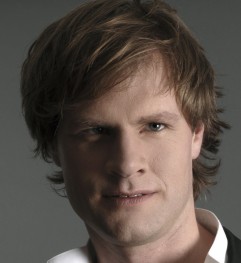 Håkan has appeared at major venues and festivals including the BBC Proms’ opening night, Wigmore Hall, Bridgewater Hall, Amsterdam Concertgebouw, Stuttgart Liederhalle, Sibeliusacademin, Aldeburgh, Bath, and Cheltenham with such pianists as Iain Burnside, Julius Drake, Bengt Forsberg, Graham Johnson, Roger Vignoles, Llyr Williams and Andrew West. He has also appeared with the Hebridies Ensemble, Carducci Quartett, Gabrieli Consort, Sharoun Ensembles, BBC Symphony, Jerusalem, City of Birmingham, Bournemouth, English Chamber, Wroclaw, Zagreb, Barcelona, Gothenburg, and Malmö Symphony Orchestras conducted by Martyn Brabbins, Paul McCreech, Leonard Slatkin, Sir David Willcocks and Leon Botstein. He has frequently recorded for BBC, Private Joe by Panufnik for Polish radio, B-minor Mass on Signum Records and Elisabeth Maconchy’s opera The Departure for Chandos Records. His has sang 25 operatic roles and he created Axel in Meredith’s Tarantula in Petrol Blue, Carl in Colerige-Taylor’s Thelma and Pascoe in Huw Watkins’ In the Locked Room. Håkan teaches singing at Citylit Institute in London and is invited to Masterclasses at the Koninklijk Conservatoire Brussel.
Håkan has appeared at major venues and festivals including the BBC Proms’ opening night, Wigmore Hall, Bridgewater Hall, Amsterdam Concertgebouw, Stuttgart Liederhalle, Sibeliusacademin, Aldeburgh, Bath, and Cheltenham with such pianists as Iain Burnside, Julius Drake, Bengt Forsberg, Graham Johnson, Roger Vignoles, Llyr Williams and Andrew West. He has also appeared with the Hebridies Ensemble, Carducci Quartett, Gabrieli Consort, Sharoun Ensembles, BBC Symphony, Jerusalem, City of Birmingham, Bournemouth, English Chamber, Wroclaw, Zagreb, Barcelona, Gothenburg, and Malmö Symphony Orchestras conducted by Martyn Brabbins, Paul McCreech, Leonard Slatkin, Sir David Willcocks and Leon Botstein. He has frequently recorded for BBC, Private Joe by Panufnik for Polish radio, B-minor Mass on Signum Records and Elisabeth Maconchy’s opera The Departure for Chandos Records. His has sang 25 operatic roles and he created Axel in Meredith’s Tarantula in Petrol Blue, Carl in Colerige-Taylor’s Thelma and Pascoe in Huw Watkins’ In the Locked Room. Håkan teaches singing at Citylit Institute in London and is invited to Masterclasses at the Koninklijk Conservatoire Brussel.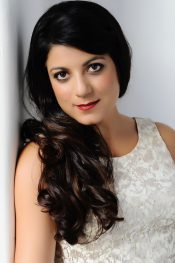 Annabella Ellis was born in Norwich, Norfolk, and is a graduate of Guildhall School of Music, Royal Academy of Music and the Royal Conservatoire Scotland ‘opera school’. At RCS Annabella performed Orlovsky (Die Fledermaus), Fiordiligi (Cosí fan Tutte), Mrs Coyle (Owen Wingrave), Tonina (Prima la music e poi le parole), covered La Mere/alto 5 (Le Vin Herbé) and Le Loup (Les malheurs d’Orphée). Additional opera roles include Mercédès/Carmen cover (Carmen), Sirene/Armida cover (Rinaldo) Longborough Festival Opera, Una Cercatrice (Suor Angelica) Dorset Opera, Drusilla/Amor (L’incoronazione di Poppea), Belinda/Second Witch/Sailor (Dido and Aeneas).
Annabella Ellis was born in Norwich, Norfolk, and is a graduate of Guildhall School of Music, Royal Academy of Music and the Royal Conservatoire Scotland ‘opera school’. At RCS Annabella performed Orlovsky (Die Fledermaus), Fiordiligi (Cosí fan Tutte), Mrs Coyle (Owen Wingrave), Tonina (Prima la music e poi le parole), covered La Mere/alto 5 (Le Vin Herbé) and Le Loup (Les malheurs d’Orphée). Additional opera roles include Mercédès/Carmen cover (Carmen), Sirene/Armida cover (Rinaldo) Longborough Festival Opera, Una Cercatrice (Suor Angelica) Dorset Opera, Drusilla/Amor (L’incoronazione di Poppea), Belinda/Second Witch/Sailor (Dido and Aeneas).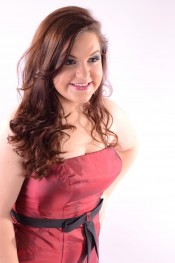 Welsh Soprano Jessica Robinson recently graduated from the Royal Welsh College of Music and Drama gaining a distinction in MA Opera Performance During her time at the RWCMD, Jessica also gained a first class honours undergraduate degree along with the Aneurin Davies memorial award, The Mansel Thomas prize, The Margaret Tann Award and the Elias Soprano award.
Welsh Soprano Jessica Robinson recently graduated from the Royal Welsh College of Music and Drama gaining a distinction in MA Opera Performance During her time at the RWCMD, Jessica also gained a first class honours undergraduate degree along with the Aneurin Davies memorial award, The Mansel Thomas prize, The Margaret Tann Award and the Elias Soprano award.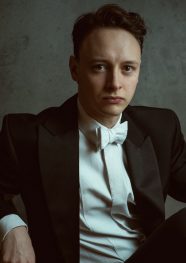 William Wallace studied at the Royal College of Music where his roles included The Mayor Albert Herring and Zweiter Preister Die Zauberflöte, and at the National Opera Studio, London, supported by the Nelly Groner Trust. He received the Dame Hilda Bracket Award from the Sadler’s Wells Trust for his performance as The Schoolmaster The Cunning Little Vixen with British Youth Opera.
William Wallace studied at the Royal College of Music where his roles included The Mayor Albert Herring and Zweiter Preister Die Zauberflöte, and at the National Opera Studio, London, supported by the Nelly Groner Trust. He received the Dame Hilda Bracket Award from the Sadler’s Wells Trust for his performance as The Schoolmaster The Cunning Little Vixen with British Youth Opera.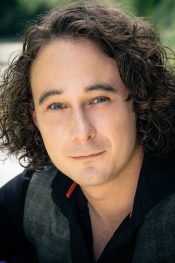 Aidan Coburn received an Honours Degree in Music from Cambridge University and completed Post Graduate Vocal Course at the Guildhall School of Music and Drama (GSMD) where he was a Teaching Fellow.
Aidan Coburn received an Honours Degree in Music from Cambridge University and completed Post Graduate Vocal Course at the Guildhall School of Music and Drama (GSMD) where he was a Teaching Fellow.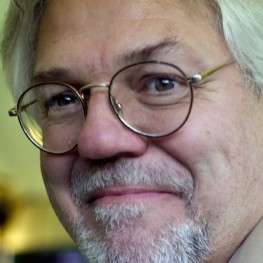 Brendan Wheatley was born in Hinckley, Leicestershire and studied at the Guildhall School of Music and Drama where he was awarded a three-year scholarship on the performers course. Another scholarship awarded to him at the end of this course enabled him to attend the Opera Course for a further year but this was cut short when he auditioned for Glyndebourne Festival Opera and was immediately offered a contract.
Brendan Wheatley was born in Hinckley, Leicestershire and studied at the Guildhall School of Music and Drama where he was awarded a three-year scholarship on the performers course. Another scholarship awarded to him at the end of this course enabled him to attend the Opera Course for a further year but this was cut short when he auditioned for Glyndebourne Festival Opera and was immediately offered a contract.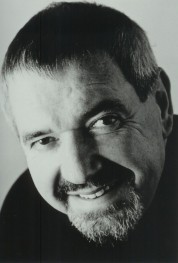 Paul studied at the Royal College of Music and the London Opera Centre. He has made over 600 appearances in principal roles with the Royal Opera, Covent Garden.
Paul studied at the Royal College of Music and the London Opera Centre. He has made over 600 appearances in principal roles with the Royal Opera, Covent Garden. Mezzo soprano Imogen Garner is increasingly in demand as an operatic and concert performer. Most recently she covered Paulina in The Winter’s Tale at English National Opera. In 2016 she covered Lulu’s mother in Berg’s Lulu and sang the role of the Mother in a workshop performance of Nico Muhly’s Marnie at ENO. In previous years Imogen has covered 2 roles in Martinu’s Julietta and has sung excerpts of the lead role in a new Opera written by James Ellis and Louis de Bernieres at the Hay Festival on behalf of ENO. She joined the Extra Chorus of ENO in The Lady Macbeth of Mtsensk and The Mastersingers of Nuremburg.
Mezzo soprano Imogen Garner is increasingly in demand as an operatic and concert performer. Most recently she covered Paulina in The Winter’s Tale at English National Opera. In 2016 she covered Lulu’s mother in Berg’s Lulu and sang the role of the Mother in a workshop performance of Nico Muhly’s Marnie at ENO. In previous years Imogen has covered 2 roles in Martinu’s Julietta and has sung excerpts of the lead role in a new Opera written by James Ellis and Louis de Bernieres at the Hay Festival on behalf of ENO. She joined the Extra Chorus of ENO in The Lady Macbeth of Mtsensk and The Mastersingers of Nuremburg.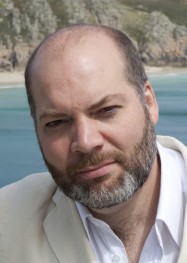 Mark studied at the Royal Scottish Academy of Music and Drama and comes from Suffolk. He has sung with many opera companies including Royal Opera, English National Opera, Opera North, Raymond Gubbay, Scottish Opera, Garsington Opera, Longborough Festival Opera, Opera Holland Park, Mid Wales Opera and Savoy
Mark studied at the Royal Scottish Academy of Music and Drama and comes from Suffolk. He has sung with many opera companies including Royal Opera, English National Opera, Opera North, Raymond Gubbay, Scottish Opera, Garsington Opera, Longborough Festival Opera, Opera Holland Park, Mid Wales Opera and Savoy New Zealand born Tenor Richard Hansen has completed a Master of Music and Postgraduate Diploma in Solo Performance at the Royal Northern College of Music with Thomas Schulze.
New Zealand born Tenor Richard Hansen has completed a Master of Music and Postgraduate Diploma in Solo Performance at the Royal Northern College of Music with Thomas Schulze.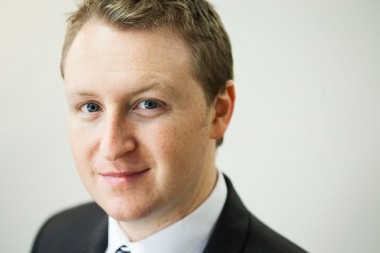
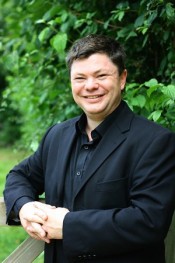 John has been Musical Director for Swansea City Opera since 2014 and he is also currently Principal Conductor of Redhill Sinfonia. John was organ scholar of Hertford College, Oxford before postgraduate studies at the Guildhall School of Music (repetiteur) and The Royal College of Music (conducting).
John has been Musical Director for Swansea City Opera since 2014 and he is also currently Principal Conductor of Redhill Sinfonia. John was organ scholar of Hertford College, Oxford before postgraduate studies at the Guildhall School of Music (repetiteur) and The Royal College of Music (conducting).
